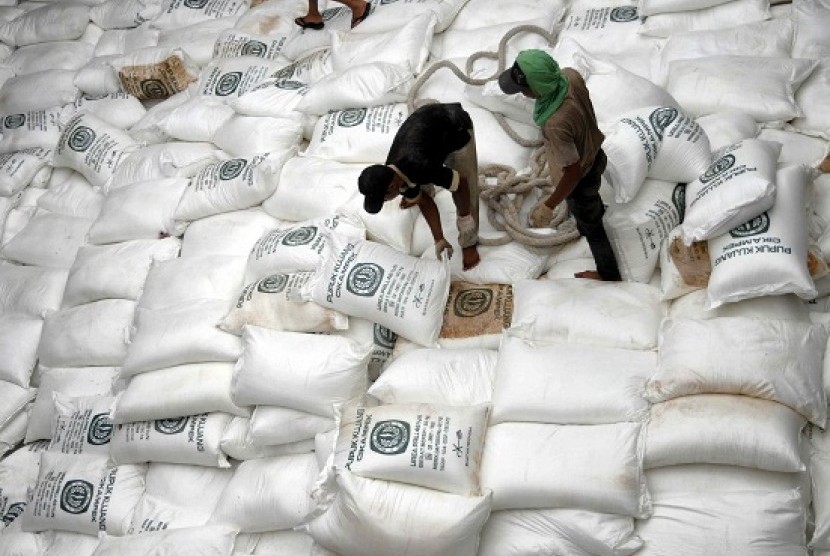REPUBLIKA.CO.ID, JAKARTA -- By Otniel Tamindael
There are ample stocks of subsidized fertilizers for meeting the needs of the farmers in Indonesia, and therefore, they should not harbor any worries related to fertilizer scarcity.
As of early January 2014, the stock of fertilizers reached 1.38 million tons or up 103 percent from the provision stock of 539,503 tons, which were required by the government through the Ministry of Agriculture.
The spokesman of PT Pupuk Indonesia Holding Company (PIHC) Harry Purnomo recently stated at a press statement here that the fertilizer scarcity in some regions was due to the decline of the 2013 subsidized fertilizer quota since November that year.
But, he noted that the PIHC was ready to cope with the scarcity in the regions due to a delay by a number of regional governments in issuing allocated fertilizer provisions.
"The PIHC is committed to providing and distributing the subsidized fertilizers to the farmers in the regions as long as the Definitive Plan for Group Needs (RDKK) was made available," he noted.
Over the weekend, President of state-owned fertilizer company PT Petrokimia Gresik Hidayat Nyakman remarked in Gresik, East Java, that the fertilizer scarcity had occurred, as many district and city administrations had no set regulations on fertilizer distribution.
"Of the 470 districts and cities in Indonesia, only 15 district heads have issued the regulations on the distribution of fertilizers," he pointed out.
Hidayat noted that the regulations had the potential to become a foundation or basis for the fertilizer producers to adhere to the existing mechanism in the distribution of fertilizers to the farmers.
However, Hidayat claimed that PT Petrokimia Gresik will continue to distribute the subsidized fertilizers according to the set volume, as the efforts to meet the farmers' requirements should not be delayed.
He acknowledged that the scarcity of fertilizer supply in the past few years was also attributed to a decline in the production as a result of the budget revision of subsidized fertilizers, following the depreciating value of the rupiah against the US dollar.
"However, based on an agreement reached between the government and the House of Representatives, producers are required to continue serving the farmers," he added.
According to him, the PT Petrokimia Gresik has already produced and distributed 288 thousand tons of subsidized fertilizers or 72 percent of its target of 4.5 million tons for this year.
He remarked the distribution of fertilizers was in line with the regulation set by the Agricultural Ministry that requires the company to distribute 4.5 million tons of subsidized fertilizers this year.
The subsidized fertilizers include 193 thousand tons of urea, 800 thousand tons of ZA, 760 thousand tons of SP-36, 2 million tons of NPK, and 800 thousand tons of petroganik.
Hidayat pointed out that the company requires the support of provincial governors and other lower district administrations in order to facilitate the distribution of subsidized fertilizers in the regions.
In East Nusa Tenggara (NTT), local Agriculture and Plantation Department spokesman Anis Tay Ruba stated on Monday, that the provincial government had commenced the distribution of subsidized fertilizers to the farmers across the island province.
"Between January 1 and 15, we have distributed 4.9 thousand tons of subsidized fertilizers to meet the farmers' needs in the province," local Agriculture and Plantation Department spokesman Anis Tay Ruba stated here on Monday.
According to him, the subsidized urea fertilizers, which have been distributed, were part of the 18.8 thousand tons provided to the East Nusa Tenggara farmers by the Ministry of Agriculture.
Anis noted that so far, 3,170 tons of fertilizers have been distributed to the farmers in the Kupang area, 1,360 tons to the Flores Island, 361 tons to the Rote Island, eight tons to Waingapu, and the rest will follow soon.
He added that the fertilizers will be more than enough to meet the demands of the farmers in the province because the distribution is handled by two fertilizer companies, namely PT Pupuk Kaltim and PT Petro Kimia Gresik.
"Besides, the two companies will soon ship another 5.8 thousand tons of fertilizers to East Nusatenggara, early February, which will be distributed to the other districts in the province," he affirmed.
Meanwhile, East Java Deputy Governor Saifullah Yusuf remarked in Surabaya that the provincial government will soon follow up with the regulations on fertilizer distribution.
Saifullah noted that he wasn't aware about the regulations, but if the fertilizer shortage in the province was owing to the regulations, then he will surely follow it up.
"I will inquire about the matter with the East Java Agriculture Department and will soon follow it up for all the districts and cities, so that fertilizer distribution can be commenced at the earliest," he noted.
As the amount of subsidized chemical fertilizers has been reduced, Agriculture Minister Suswono encouraged the Indonesian farmers to use organic fertilizers in order to restore the soil fertility.
"So far, the farmers have used inorganic fertilizers for efficiency reasons in order to get the desired yield, but it is now time to switch to organic fertilizers," the minister remarked during the harvest at Subak Padanggalak, in Bali, on Sunday.
According to him, the soil and ecosystem have borne considerable brunt, as the farmers have constantly used inorganic fertilizers in large quantities.
"Under such circumstances, we expect the farmers to gradually switch to using organic fertilizers, which are processed through modern technology," Suswono stated.
The minister added that since it took a long time to produce traditional organic fertilizers, farmers opted for inorganic fertilizers to boost rice cultivation at the cost of degrading the soil fertility.


